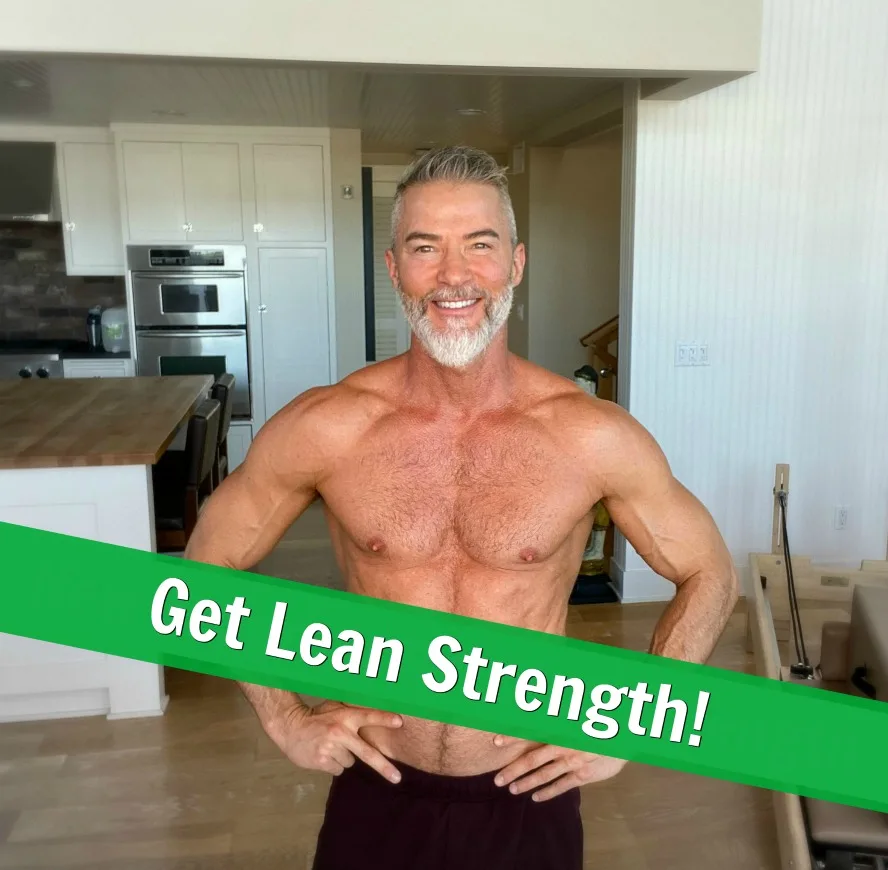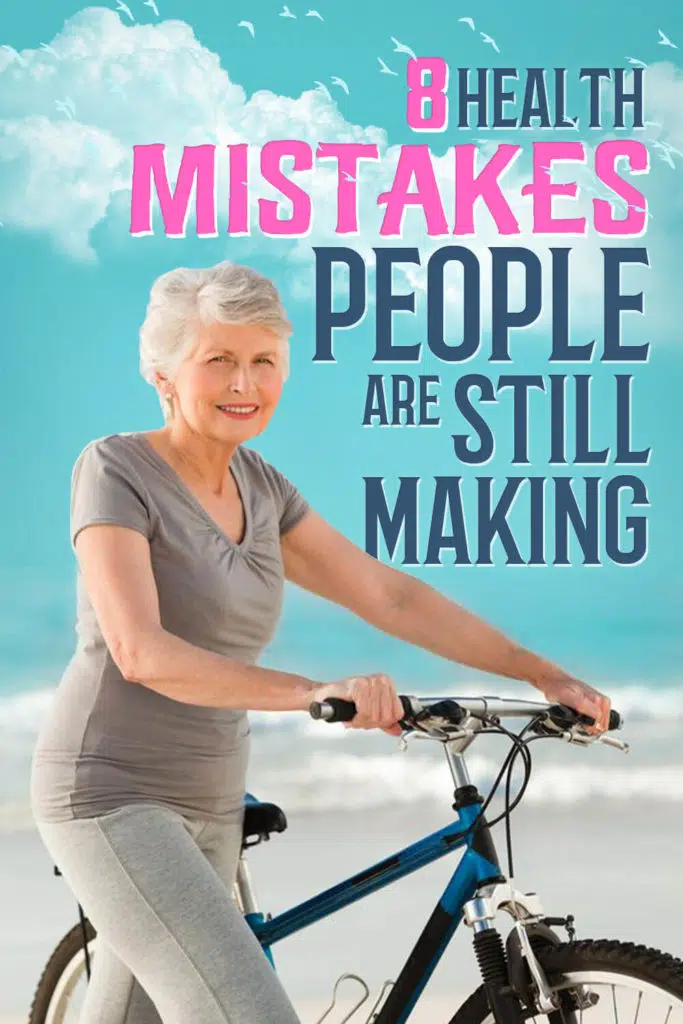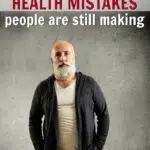Is it important to you to stay healthy? Maintaining good health is less about the habits you actively cultivate and more about the pitfalls you consciously avoid. This realization about avoiding common health mistakes stems from my personal journey, where I’ve witnessed the profound impact of my past missteps on my overall well-being.
Surprisingly, this experience is not unique; many individuals find themselves grappling with the consequences of earlier health-related decisions as they navigate the latter half of their lives.
By shedding light on these common missteps, I hope to empower you to make more informed choices, ultimately paving the way for a healthier, more vibrant future for yourself.
I encourage you to refer to the inspirational video lower within this article. Additional resources and research study citations are included below this article if you want to dive deeper into the science of optimal health and building a robust immune system.
Staying Healthy After 50: Dodging Common Pitfalls
Research has established that most people think of themselves as healthier than they actually are:
- we think we eat better than we actually do;
- we believe we’re physically active more than we actually are.
Humans have blind spots in their own self-awareness.
For example, a study by van Sluijs et al. (2007) revealed that individuals often overestimate their physical activity levels when self-reporting, compared to objective measures using accelerometers, and Brug et al. (1994) found that most people tend to overestimate their fruit and vegetable intake compared to their actual consumption, as measured by food frequency questionnaires and 24-hour dietary recalls (1995).
Almost everyone is keeping at least one big secret from themselves. And other people are almost twice as good at seeing our habits more accurately than we see them ourselves.
Since we see others with more clarity, that also means that our friends, family, and colleagues often already know – better than we do – what we need to do to stay healthy or become even healthier.
Research indicates that a significant number of overweight and obese individuals tend to underestimate their weight status, often perceiving themselves as healthier than they are. A study focused on UK adults found that a considerable portion of individuals with a Body Mass Index (BMI) categorized as overweight perceived their weight to be ‘about right.’

Specifically, 31% of overweight women and 55% of overweight men considered their weight status as normal. This misperception was also prevalent among individuals whose waist circumference suggested an increased risk of future health issues.
Basically, people often exhibit an optimistic bias regarding their own health risks, leading them to believe they are less likely to experience negative health outcomes compared to others.
Stay Healthy: 8 Secret Health Mistakes Aging You Faster
I don’t want other people to make the same health mistakes I did.
I invite you to learn from my mistakes so you can stay healthy. Here are the pitfalls to avoid.
Health Mistake #1: Not Realizing that You Pay Either Way
I realize now that health has a price tag, either way.
Health costs time, energy, and money.
You can pay a little now.
Or, you can pay a whole lot more later.
Illness is more expensive than health. It’s best to avoid it – as often as possible and as long as possible.
Invest some money, time and energy into improving your health now so that you don’t have to spend a literal fortune trying to restore broken health later.
Health Mistake #2: Not Realizing Nutritional Loopholes Can Be Dangerous
It’s so tempting to get hung up on trendy catchphrases such as “simple carbs,” “complex carbs,” “organic,” and “gluten-free.”
While all of the above catchphrases are absolutely valid, they can still be used to rationalize the eating of whatever carb is trendiest, thereby masking a more significant problem:
- Newer scientific inquiries are confirming that excess carbohydrates feed cancer cells, such as the thyroid, colorectal, and prostate.
The keyword in the above sentence is “excess.” The type and quantity of carbohydrates consumed can have different effects on health.
That means you have to earn your carbs. For example:
- Athletes often need a lot of carbs (and protein).
- Sedentary people need far fewer carbs.
- Because each human body has a unique chemistry, each person has to determine – perhaps with the help of their medical doctor – what average daily intake of carbohydrates best helps them to thrive.
Many find that – as long as they’re not consuming more calories than they’re expending – health is improved when they dial down the number of carbohydrates they consume and dial up the number of healthy fats.
It’s human nature to become interested in trends. However, it’s essential to retain a healthy amount of skepticism to prevent using nutritional trends as a way to rationalize incompatible eating habits.
Health Mistake #3: Not Understanding Your Most Valuable Resources
Two of your most valuable assets are your time and attention.
Of the two, attention is more internal and harder to control:
- Most of the thoughts we think are habitual and negative.
- Guiding your own thoughts purposefully can be difficult at first.
- With practice, you can replace negative thoughts with more positive ones, which will make an enormous difference in every area of your life.
Fortunately, making changes in how you choose to spend your time is easier than changing where you direct your attention – and so it’s a good place to start because you can rack-up some wins right away.
Life seems to flow better when the things you enjoy also happen to be good for you:
- Start spending more time doing things you enjoy that are also beneficial to your body and psyche.
- Begin quietly and strategically phasing-out negative adults in your life (with gratitude for the lessons you’ve acquired) to make more room for positive people.
Health Mistake #4: Obsessing Over Body Composition Instead Of Longevity
Many believe that body composition – the ratio of your body’s fat to muscle – is the ultimate indicator of health.
It isn’t.
It’s one important indicator of health, but it’s not the only one.

Tracking Calories to Stay Healthy
Almost everyone wants washboard abdominals, and that’s a worthy goal. You can achieve that goal by restricting calories.
But even more important than a tight waistline is the condition of your body on the inside.
To improve the internal functioning of your body – and, therefore, to extend the number of healthy years in your lifespan – you need to track more than just calories. You need to track macros and inflammation, too.
Tracking Macros to Stay Healthy
Understanding your macros (short for “macronutrients”) means periodically tracking the ratio of carbohydrates, proteins, and fats you consume on a typical day.
Each person’s ideal ratio is different. For instance, high protein is excellent for athletes, but excess protein in sedentary people can create hidden health issues.
Tracking Inflammation to Stay Healthy
A healthy body responds to internal threats by creating localized inflammation. This is a good thing.
However, chronic inflammation – at the root of more than half of all deaths – is when the body’s inflammatory process becomes overactive and confused.
One way to reduce chronic inflammation is to reduce the number of irritants to which your body is typically exposed.

An easier way to tackle this is to stop eating foods your body finds irritating – because even the most subtle irritation can become a significant problem when exposure is relentless.
Improved dietary choices have been shown to result in reduced inflammation within the body, according to various rigorous reviews:
- Dietary influences such as glycemic index (GI) and load (GL), fiber, fatty acid composition, magnesium, carotenoids, and flavonoids play a significant role in reducing inflammation. (Leo Galland, 2010, PubMed).
- Studies mentioned by Harvard Health emphasize that an anti-inflammatory diet rich in vegetables, fish, and healthy oils like olive oil can lower inflammation levels and have positive effects on physical and emotional health.
- The Mediterranean diet, known for its emphasis on omega-3s, vitamin C, polyphenols, and fiber-rich foods, has been identified as particularly beneficial in helping individuals control inflammation and reduce the risk of inflammatory diseases.
What a body finds irritating is unique to each individual, so it helps to pay close attention to your body after eating (for instance, did your energy level rise or lower?). Additionally, getting your blood analyzed twice a year can be very helpful.
Health Mistake #5: Not Appreciating that True Health Is Sometimes Counterintuitive
It isn’t always obvious what will help you stay healthy.
For example:
- It seems like to get great-looking abs, you should do ab exercises. Okay, yes. But, really, great abs are built mainly in the kitchen with an anti-inflammatory diet.
- It seems like you should train hard in the summer to maintain a summer physique. But really, summer bodies are built in the winter.
- It seems like taking supplements would guarantee to fill in the missing gaps in your nutrition. But it’s not what you eat; it’s what you absorb, which is why gut health is so important.
Sometimes we make assumptions without even realizing we’re making them. This is especially true on the topic of how to stay healthy.

Contrary to current urban myth, when it comes to flu cases, an analysis of 80 research studies reveals that masks can benefit everyone (both the infected and non-infected). On a flight with some passengers afflicted with the swine flu, for example, none of the passengers wearing masks got sick, whereas around a third of those who didn’t wear masks got sick. By the way, cloth masks (a bandana covering the mouth and nose like a bandit) are about 13 times less effective than surgical masks. (Source)
Health Mistake #6: Training Your Body Asymmetrically
People tend to overtrain certain body parts over others, eventually creating asymmetry in the body that impacts appearance and safety.
For example, exercisers often train their arms more than their legs and their chest muscles more than their back muscles – a significant health mistake because it leads to poor posture and lower back injuries.
Another frequent mistake is making front shoulders – anterior deltoids – disproportionately stronger than lower abdominals and glutes. This leads to an unfortunate pelvic placement and a top-heavy slouch.
I consider glutes to be part of the core.
I see runners sometimes who – even though their upper body has good form and their lower body has good form – look strange running because their upper body is not integrated with their lower body. That’s what core strength does – it helps the musculature flow together beautifully. It organizes.
A common problem I see lately in modern physiques is:
• weak glutes
• coupled with weak lower abdominals.
This area is meant to be your body’s powerhouse!
When you set goals, do so based on what areas of your physique are currently weakest.
Strive to be objectively honest when you look in the mirror – not to shame yourself, but so you can make informed decisions about your fitness programming.
Health Mistake #7: Neglecting Movement Variation
People get into exercise ruts.
There are “treadmill people,” “elliptical people,” and “spin people.”
Over-focusing on a particular piece of gym equipment or type of exercise will lead to imbalances and overuse injuries.
Solution? Become a cross-trainer.
A study titled “Benefits of Cross-Training: Scale Development and Validity” provides evidence supporting the benefits of cross-training over solely engaging in one type of exercise. Additionally, a study published in the Journal of Strength and Conditioning Research found that cross-training can lead to significant improvements in aerobic capacity and muscle strength, benefiting athletes in various sports. These studies collectively establish that fitness cross-training is often more beneficial than doing only one type of exercise.
Cross-training means you intentionally vary your movement patterns because you acknowledge that your body adapts too quickly.
The genius of cross-training is that not only will your muscles start responding again, but so will your metabolism.
Health Mistake #8: Over-identifying With Your Personality, Beliefs, and Thoughts
People get attached to their shtick so much that they begin to fear that if their personality changes, they won’t be themselves anymore.
Please understand that your personality and your soul essence are two different things.
Your soul essence is the unique and timeless part of you.
Your personality is a persona you wear like a hat, and – like a hat – you can change it, and you’ll still be you.
Your thoughts, beliefs, and persona are meant to evolve as you gain life experience.
It’s okay to experiment with a new way of being in the world to see if the new way works better than the old way.

How to Not Get the Flu This Year
No strategy for taking your health to the next level would be complete without addressing how to stop getting colds and flu.
Many are in the habit of getting a cold or flu at least once a year. We’ve come to think of this as normal and expected.
In fact, you do not have to get colds and flu, and certainly not as often as once a year.
Here's what to do (and what not to do) to lessen exposure to viruses – and to prevent viruses from taking hold if you are exposed.
Instructions
- Reduce Sugar and Stress. Make nutritional and exercise improvements to bolster your immune system so that you are less susceptible to germs and viruses. Avoid flour, excess carbohydrates, and alcohol. Eat a variety of vegetables, quality meats, and a little fruit. Put a breathing app on your phone and use it for a few minutes each day to help keep your lung tissue robust and to keep stress hormone levels low within your body.
- Develop New Hand Habits. Among the easiest ways to prevent catching colds and flu is to simply train yourself to stop touching your face. The more you touch your face, the more often you will get sick. Germs love to enter your body via the moist entry points of your head: your eyes, ears, mouth, and – especially – your nose.
- Follow CDC Guidelines. Educate yourself on the guidelines from your country's department of disease control. If they suggest wearing a mask and getting vaccinated, then do it.
Notes
Hand sanitizers are nice, but it’s impossible to sanitize your hands often enough to keep the germs off of your fingers. You open doors and cupboards, use light switches, turn faucets, type on keyboards, and hold pens and smartphones more than you realize. You can solve the issue by simply not touching your face (most people touch their own faces far more often than they realize – they do it reflexively and absent-mindedly):
- Use judgement before you reach into the candy tub in the office break-room, or into the sample cheese platter at the grocery store.
- Many buffets and sampling trays at stores and restaurants are at nose-level with children. Kids can cough onto food that is just inches from their mouth because their height positions them perfectly underneath the “sneeze guard.”
- 95% of the people who do wash their hands, do it ineffectively. Hand-washing is only effective when it happens for a long enough duration (at least 20 seconds, according to the Centers for Disease Control) and if it’s comprehensive enough (massaging a bit of that soap into the nail beds, the tops of the hands, and in between the fingers – not just the palms).
Of course, intellectually, everyone already knows to wash their hands and not touch their face. But what people underestimate, is the extent to which these habits, when done properly and consistently, can positively impact their body. Improvements in hand-washing habits correlate with a decrease in illness.
Conclusion on How to Stay Healthy and the Key Mistakes to Avoid for a Longer, Vibrant Life
Avoid these eight common health mistakes so you can look and feel your best – and extend the number of vital years in your lifespan.
For further protection, it’s interesting to note that – according to independent and unbiased analyses of double-blind research meta-studies – high-quality Vitamin C, vitamin D, zinc, and echinacea supplementation may provide an edge against colds and the flu; however, they should serve only to complement your main defensive arsenal: good hygiene, exercise, proper hydration, healthy diet, restful sleep, and stress control.

In conclusion, staying healthy after 50 is not about chasing the latest health trends or striving for an unrealistic physique. Instead, it’s about being mindful of the common pitfalls that can derail your well-being and taking proactive steps to avoid them.
By recognizing the value of your time and attention, prioritizing longevity over mere aesthetics, embracing variety in your movement patterns, and allowing your beliefs and persona to evolve, you can sidestep these health mistakes and pave the way for a vibrant, fulfilling life.
Remember, the journey to optimal health is not a sprint but a marathon – and with the right mindset and habits, you can cross that finish line with a smile on your face and a spring in your step!
Stay Healthy: Additional Guidance on Avoiding Health Mistakes
People Don’t Know Themselves Well – https://www.theatlantic.com/health/archive/2018/03/you-dont-know-yourself-as-well-as-you-think-you-do/554612/
Brug, J., Lechner, L., & De Vries, H. (1995). Psychosocial determinants of fruit and vegetable consumption. Appetite, 25(3), 285-296.
Cross-Training Prevents Injuries – B. Walker (2024) – https://stretchcoach.com/articles/cross-training/
Ronda, G., Van Assema, P., & Brug, J. (2001). Perceptions of one’s own health risks, psychological factors, and awareness of physical activity levels. Health Promotion International, 16(4), 305-314.)
Others Know Us Better – https://www.sciencedaily.com/releases/2010/02/100226093235.htm
Startling Statistics on Health in a First-World Country – https://www.hhs.gov/fitness/resource-center/facts-and-statistics/index.html
CDC Guidelines for Respiratory Viruses – https://www.cdc.gov/respiratory-viruses/guidance/respiratory-virus-guidance.html
Inflammation Connected to Disease – https://factor.niehs.nih.gov/2020/1/papers/inflammation/index.htm
Excess Protein Intake Connected to Disease in Sedentary Populations – https://www.livescience.com/43839-too-much-protein-help-cancers-grow.html
